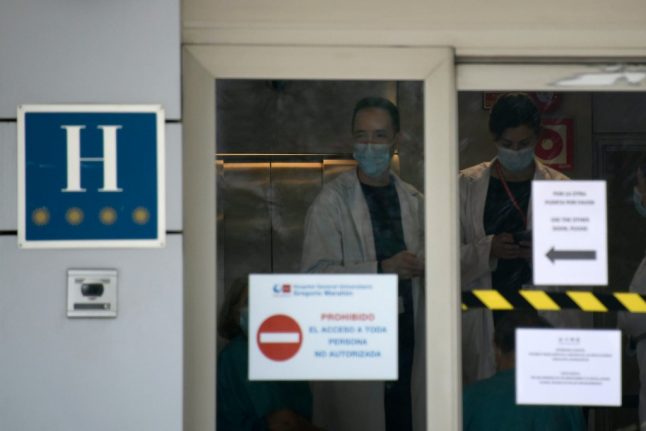Regional authorities in Madrid, the region of Spain hardest-hit by the outbreak, plan to repurpose more hotels over the coming days to treat coronavirus patients.
This will help “alleviate the pressure” on hospitals which are starting to become overcrowded and free up beds for more seriously ill patients, the regional government of Madrid said in a statement.
Ambulances transported patients to the 359-room Gran Hotel Colon, which is about a 10-minute walk from the Gregorio Marañon hospital, one of the Spanish capital's biggest.

The hotel is made up of two buildings which are linked by a large garden and art gallery.
Medical staff wearing white protective suits, face masks and gloves then began escorting patients inside the building under the glare of TV cameras which were kept at a distance.
Another four-star Madrid hotel, the Marriott Auditorium, is scheduled to start receiving patients on Friday.
Hoteliers have offered regional authorities the use of a total of 40 hotels in the Madrid region with 9,000 beds to treat coronavirus patients, according to Madrid's main hotel association.
The hotels will be used to house patients “whose symptoms require medical attention without the need to be hospitalised, both at the start of the disease as well as during the final phase,” the regional government statement
said.
Spain on Thursday announced that deaths from the novel coronavirus had jumped by nearly 30 percent over the past 24 hours to 767, while the total number of confirmed cases of the disease jumped by around 25 percent to 17,147.
Madrid accounts for 40 percent of the total infections in Spain and two-thirds of the deaths.
Spain has the fourth-highest number of confirmed cases of the virus in the word after China, Italy and Iran and many of its hotels are being emptied by the pandemic.
Health services are at breaking point in the capital as intensive care units across all Madrid’s hospitals reach saturation point and vital equipment is scarce.
On Wednesday morning there were 491 patients with coronavirus in ICU’s at Madrid hospitals fighting for their lives, a figure that had tripled in five days. But by Thursday that number had soared again by one hundred new critical patients to 590.
Medics complain that they don’t have the equipment they need; not only life-saving ventilators required to treat critical patients fighting pneumonia but basic protective equipment that will keep the staff safe.
On Thursday it was announced that a 52 year-old nurse in the Basque Country had died after contracting covid-19, becoming the first health worker to perish from the virus in Spain.
READ LATEST:
- LATEST: Spain's coronavirus deaths jump by a third overnight
- Spain lockdown: Top ten tips to survive (and thrive) during quarantine
- Madrid launches coronavirus diagnosis app to relieve call centre



 Please whitelist us to continue reading.
Please whitelist us to continue reading.
Member comments